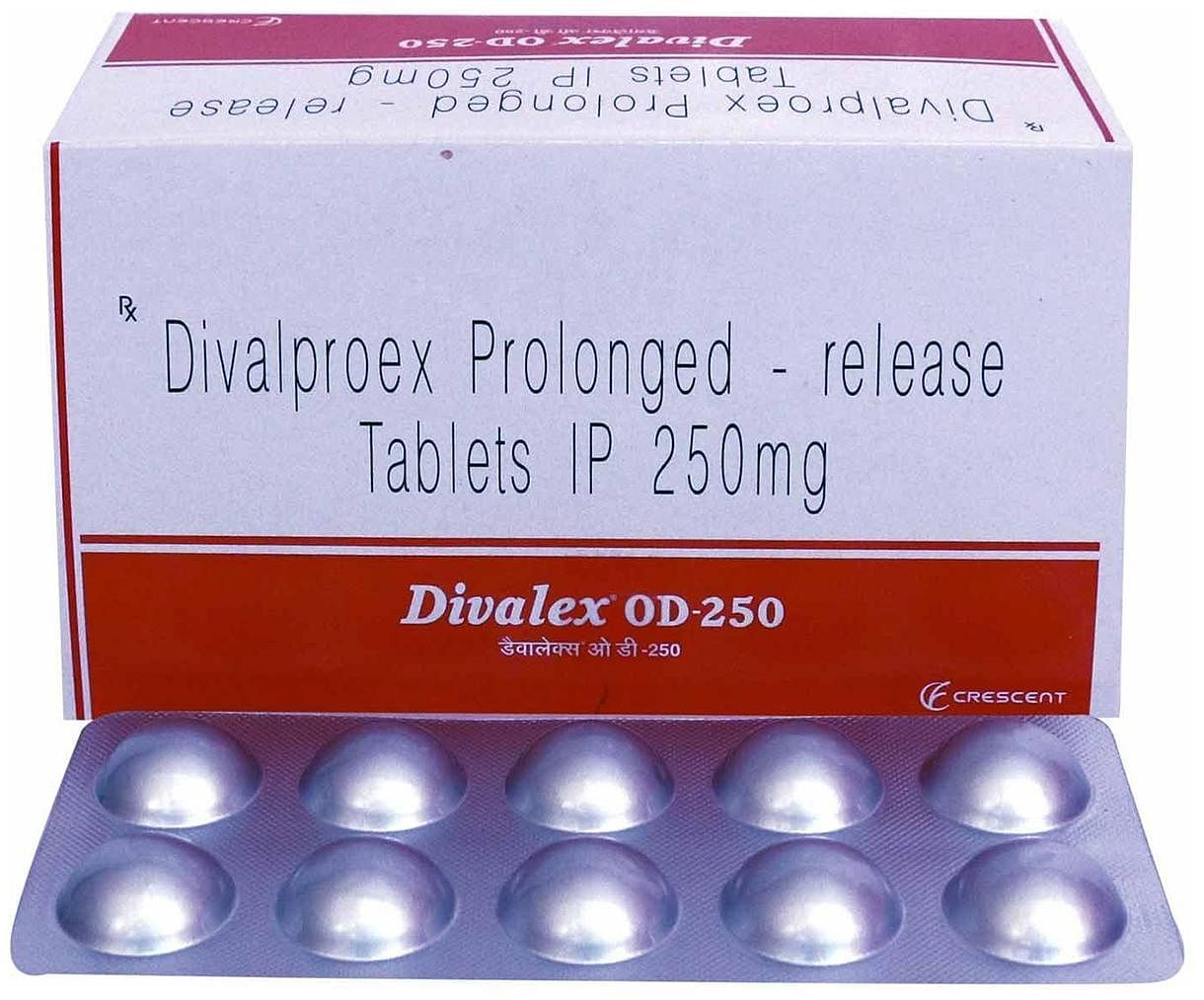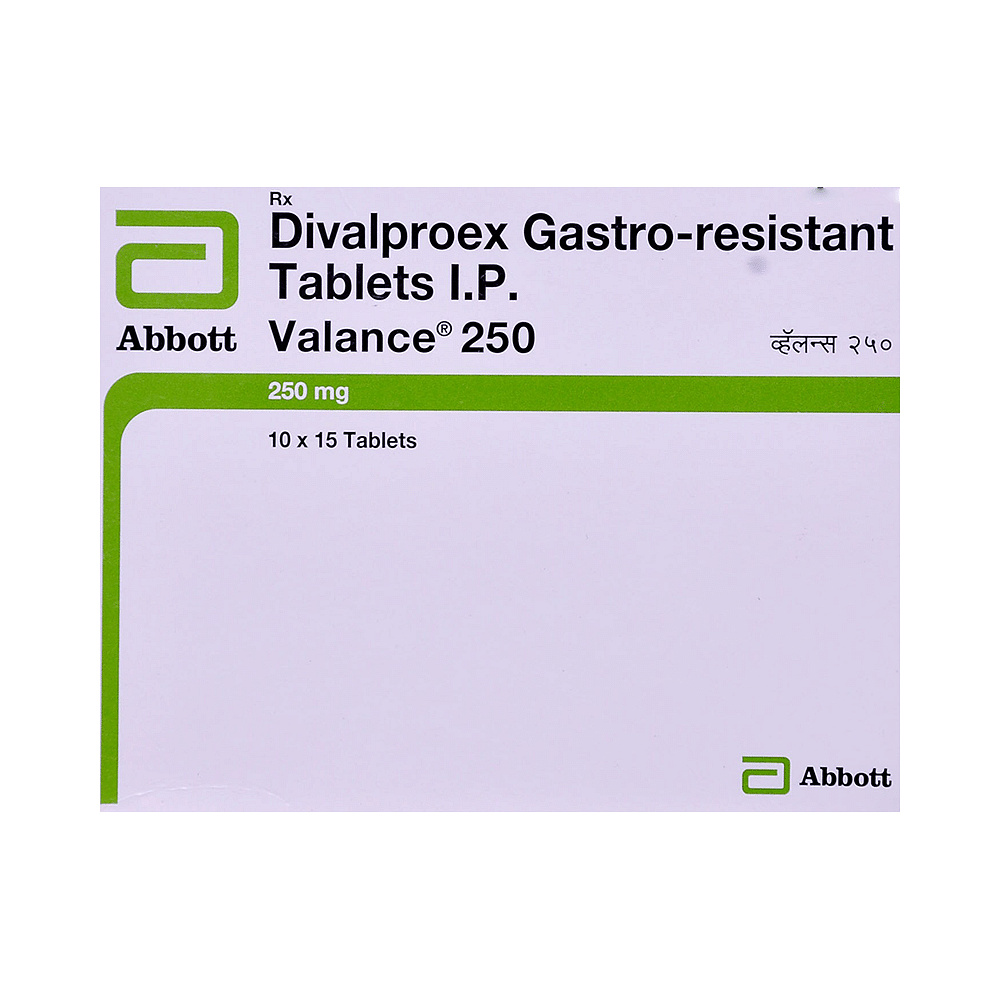
Valrox D 250mg Tablet
Manufacturer
Psycormedies
Salt Composition
Divalproex (250mg)
Key Information
Short Description
Valrox D 250mg Tablet is a medicine used to treat epilepsy, prevent migraines, and occasionally bipolar disorder.
Dosage Form
Tablet
Introduction
Valrox D 250mg Tablet may be used alone or in combination with other medicines. The dose and how often you need to take it will be decided by your doctor so that you get the right amount to control your symptoms. You can take this medicine with or without food but take it at the same time each day to get the most benefit. It usually takes a couple of weeks to work. It is important to take this medicine regularly and for as long as you are advised even if you feel well. Missing doses may trigger seizures and if you stop your condition may get worse. It should never be stopped suddenly.
Directions for Use
Take this medicine in the dose and duration as advised by your doctor. Swallow it as a whole. Do not chew, crush or break it. Valrox D 250mg Tablet may be taken with or without food but it is better to take it at a fixed time.
Safety Information
Side Effects
Headache Blurred vision Nausea Vomiting Dizziness Tiredness Unsteadiness Bruising Decreased body temperature
Alcohol Warning
Valrox D 250mg Tablet may cause excessive drowsiness with alcohol.
Breastfeeding Warning
Valrox D 250mg Tablet is safe to use during breastfeeding. Human studies suggest that the drug does not pass into the breastmilk in a significant amount and is not harmful to the baby.
Pregnancy Warning
Valrox D 250mg Tablet is unsafe to use during pregnancy as there is definite evidence of risk to the developing baby. However, the doctor may rarely prescribe it in some life-threatening situations if the benefits are more than the potential risks. Please consult your doctor.
Interacting Medicines
Alprazolam Chlordiazepoxide Clobazam Clonazepam
How it works
Valrox D 250mg Tablet is an antiepileptic medication. It controls seizures or fits by decreasing the abnormal and excessive activity of the nerve cells in the brain.
Quick Tips
Take your medication regularly as directed by your doctor as missing doses can trigger seizures. It can be taken with or without food Better to take with food to avoid stomach upset. Do not change the brand of your medicine and make sure that you have sufficient amount of medicine present with you. Practice yoga every day. Get enough sleep at nighttime. Limit the use of screen time such as mobile/laptop. Take your medication on time. Monitor your weight during treatment with this medicine as it can cause weight gain.
Related Medicines

Divalex OD 250 Tablet

Janprox 250mg Tablet

Divatra 250mg Tablet

Diviko 250 Tablet

Proexsun 250mg Tablet

Valcalm 250mg Tablet

Valance 250 Tablet

Eprea 250mg Tablet

P Stable OD 250mg Tablet

Genval OD 250mg Tablet
Frequently asked questions
What happens if I stop taking Valrox D 250mg Tablet?
You should not abruptly stop taking Valrox D 250mg Tablet without consulting your doctor. Gradually decreasing the dosage under their guidance is recommended to minimize potential withdrawal symptoms.
Is Valrox D 250mg Tablet a mood stabilizer?
Yes, Valrox D 250mg Tablet can sometimes be used as a mood stabilizer. It is prescribed for patients experiencing rapid mood changes. This medication calms the overactive brain activity associated with such fluctuations.
Can Valrox D 250mg Tablet cause weight gain?
Yes, Valrox D 250mg Tablet may contribute to weight gain. It can induce hunger by affecting the body's metabolism and appetite regulation. Monitoring your diet and incorporating regular exercise into your routine is essential for maintaining a healthy weight.
Does Valrox D 250mg Tablet make me sleepy?
Yes, Valrox D 250mg Tablet may cause drowsiness. Avoid driving or engaging in activities that require alertness until you are aware of its potential effects.
Does Valrox D 250mg Tablet cause hair loss?
Yes, Valrox D 250mg Tablet may lead to temporary hair loss. However, it's typically dose-related and resolves itself after a period of time. Consulting your doctor is advisable if the hair loss persists beyond a certain timeframe.
Can Valrox D 250mg Tablet damage my liver?
Yes, Valrox D 250mg Tablet may cause liver damage. This risk is heightened during the first six months of treatment. Symptoms to watch for include nausea or vomiting, loss of appetite, stomach pain, dark-colored urine, facial swelling, and yellowing of the skin or whites of the eyes. Regular monitoring of liver function tests is crucial during the initial 6 months.
Can I drink alcohol while taking Valrox D 250mg Tablet?
Avoid consuming alcoholic beverages while on Valrox D 250mg Tablet. Combining alcohol with this medication can increase drowsiness, dizziness, or lightheadedness.
What laboratory tests should I undergo before taking Valrox D 250mg Tablet?
Your doctor may recommend blood tests such as complete blood count (CBC), platelet count, and bleeding time assessments. These tests are also used to assess the likelihood of spontaneous bruising or bleeding. Additionally, liver function tests are typically conducted prior to therapy.
What should I do if I experience abdominal pain, nausea, and anorexia?
If you experience acute severe abdominal pain along with nausea and vomiting, it may signify pancreatitis. Immediately contact your doctor for prompt medical attention. Your doctor might order a serum amylase test to confirm the diagnosis.
How can I check for an overdose of Valrox D 250mg Tablet?
An overdose of Valrox D 250mg Tablet may lead to symptoms such as headaches, blurred vision (due to pupil constriction), lack of reflexes, confusion, and fatigue. You may also experience weakness or muscle limpness, seizures, loss of consciousness, behavioral changes, and difficulty breathing.


